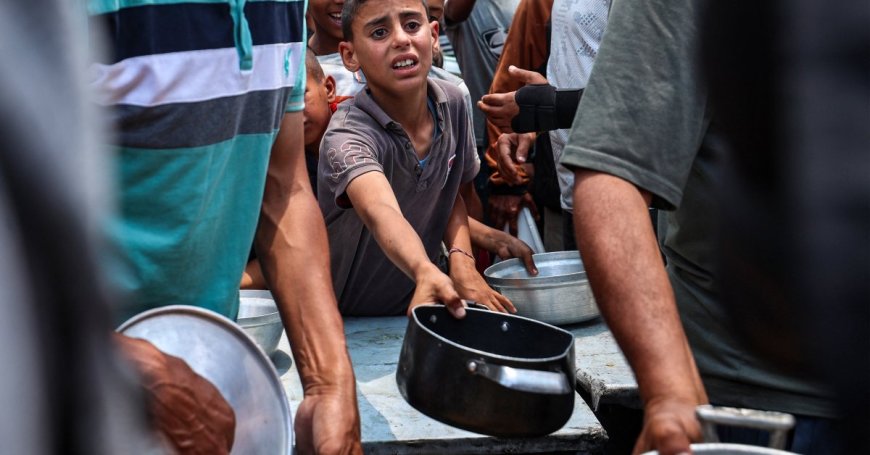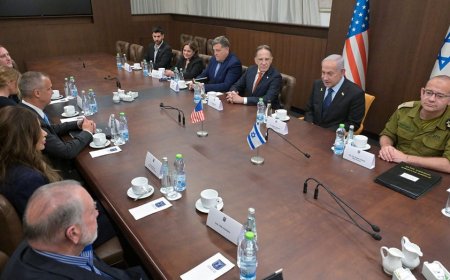Former Israeli PM Says Country’s Action in Gaza is ‘Close to a War Crime,’ as U.N. Warns 14,000 Babies Could Die
According to Israeli officials, 93 aid trucks entered the Gaza Strip on Tuesday, but experts say that is not nearly enough.


Former Israeli Prime Minister Ehud Olmert has said that Israel’s current actions in Gaza are “very close to a war crime,” describing the Israel-Hamas war as one “without purpose.”
Olmert, who was Israel’s Prime Minister between 2006 and 2009, told the BBC on Tuesday: “From every point of view, this is obnoxious and outrageous. We are fighting the killers of Hamas, we are not fighting innocent civilians. And that has to be clear.” [time-brightcove not-tgx=”true”]
The assessment from Olmert came after Yair Golan, the leader of the Democrats in Israel, heavily criticized Prime Minister Benjamin Netanyahu’s government. Speaking to Israeli radio Reshet Bet, Golan said: “A sane country doesn’t engage in fighting against civilians, doesn’t kill babies as a hobby, and doesn’t set for itself the goals of expelling a population.”
Netanyahu “strongly condemned” Golan’s comments via a post on social media, accusing the reserve major general of reaching “a new low by claiming that Israel ‘kills babies as a hobby.'”
“We are conducting a multi-front war and leading complex diplomatic efforts to free our hostages and defeat Hamas, Golan and his allies in the radical left echo the most despicable antisemitic blood libels against IDF soldiers and the State of Israel,” said Netanyahu.
The criticism from Israeli politicians comes amid U.N. humanitarian chief Tom Fletcher issuing a stark warning on Tuesday morning, saying that 14,000 babies in Gaza could die within 48 hours if they do not receive urgent nutrition and care.
“This is not food that Hamas are going to steal,” he told the BBC. “We run the risk of looting, of being hit as part of the Israeli military offensive… We will be impeded, we will run huge risks, but I don’t see a better idea than getting that baby food in, to those moms, who at the moment cannot feed their own kids.”
According to Israeli officials, 93 aid trucks entered the Gaza Strip on Tuesday, following an 11-week blockade. But as of early Wednesday morning, the U.N.’s humanitarian office said the aid has only been transported to the Palestinian side of the crossing and has yet to be distributed in Gaza.
U.S. Secretary of State Marco Rubio on Tuesday said that the U.S. was “pleased” to see aid had “started to flow in again,” but recognized that it’s “not in sufficient amounts.”
On Wednesday morning, Pope Leo XIV called on Israel to allow further humanitarian aid into Gaza during his weekly general audience in the Vatican’s St. Peter’s Square. “I renew my fervent appeal to allow for the entry of fair humanitarian help and to bring to an end the hostilities, the devastating price of which is paid by children, the elderly, and the sick,” the Pontiff said.
The United Arab Emirates announced on Tuesday evening that it had reached a deal with Israel to provide humanitarian aid for Gaza, following a phone call with Israeli Minister of Foreign Affairs Gideon Sa’ar. A timeline for the aid drop has yet to be released.
“The aid will address the food needs of approximately 15,000 civilians in the Gaza Strip in the initial phase,” per a statement on the UAE’s Ministry of Foreign Affairs website. “The initiative also includes the provision of essential supplies to support the operation of bakeries in the Strip, as well as critical items for infant care, while ensuring a continuous supply to meet the ongoing needs of civilians.”
Before the war began, an average of 500 aid trucks entered Gaza each day. That changed on Oct. 7, 2023, when Hamas launched a deadly assault on Israel, killing around 1,200 people and taking approximately 250 hostages. In retaliation, Israel imposed a total siege on Gaza, halting the entry of all goods, including humanitarian aid. The blockade marked the start of a prolonged crisis, with only a fraction of previous aid levels allowed in since.
While the relaunching of aid trucks has been welcomed by many, there were reports of some right-wing activists trying to block aid trucks reaching Gaza, resulting in at least two arrests. The protesters are thought to be members of right-wing groups Tzav 9 and Israeli Reservists—Generation of Victory.
On Tuesday morning, the U.K., France, and Canada issued a joint statement condemning Israel’s restrictions on humanitarian access as “wholly inadequate.” The statement called for an end to the military campaign and warned of “further concrete actions” if Israel did not comply.
Netanyahu responded via social media, saying: “By asking Israel to end a defensive war for our survival before Hamas terrorists on our border are destroyed and by demanding a Palestinian state, the leaders in London, Ottowa and Paris are offering a huge prize for the genocidal attack on Israel on October 7 while inviting more such atrocities.”
Later on Tuesday, the U.K. said it was suspending negotiations with Israel on a new free trade agreement, and that the Israeli ambassador had been summoned to formally receive the message. Foreign Secretary David Lammy announced the decision during a speech in the House of Commons, urging Netanyahu to end the blockade and military offensive. “The world is judging. History will judge them,” Lammy said.
Earlier this month, Israel formally announced an expansion of its military operations in Gaza, stating its ultimate goal was to occupy the entire territory. As of Monday, the Health Ministry said that the total death toll since the war began stood at more than 53,000.
Read more: $25 Butter and $40 Eggs: The Search for Food in Gaza
Meanwhile, for locals, the search for food proves to be increasingly difficult. In Deir al Balah, a city in the central Gaza Strip, Oday Basheer runs one of only three community kitchens still operating in the area.

“Starving people is the most vicious weapon they are using on us,” Basheer told TIME on Tuesday. “You can’t function if you are hungry all the time. Everyone is fighting for food.”
Basheer, who says several of his cousins, close friends, and an uncle have been killed in recent airstrikes, described a constant state of fear.
“You can’t be sure that your house won’t be destroyed. I keep looking at the sky, at the drones that monitor us. Just one press of a button and you can be killed in a second. Your memories will vanish and you will just be a number.”
He added that his kitchen, once producing six pots of food a day, now makes 15—each serving about 250 people. But soaring prices for basic supplies are further hampering their efforts. Since March 18, the price of flour has risen by 5,000%, while cooking oil is up 1,200%. “100 trucks won’t be enough to cover anything,” he said. “I don’t think our kitchen will get anything from these trucks.”
The U.N. and aid organizations have warned that these worsening humanitarian conditions are being exacerbated by continued bombardments of critical infrastructure. On Monday, Medical Aid for Palestinians called for urgent protection of Gaza’s healthcare facilities following the bombing of Nasser Hospital in Khan Younis.
“Nasser Hospital is the backbone of what healthcare remains in southern Gaza,” the group said. “The hospital has been targeted twice in the last week and, with each assault, risks being shut down entirely, pushing Gaza’s health system closer to total annihilation.”



















































